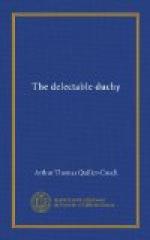Thereupon he stalked home and read the Memoirs of Eminent Etonians, and learnt from their perusal that it was indeed possible to earn a finer tombstone than any Jenkins possessed. At the end of the Christmas term, too, he acquired a copy of Dr. Smiles’s famous work on Self-Help, and this really set his feet in the path to his desire.
He determined, after weighing the matter carefully, to be a poet: for it seemed to him that of all the noble professions this was the only one the initial expense of which could be covered by his patrimony. The paper, ink, and pens came cheaply enough (though the waste was excessive); and for his outfit of high thoughts and emotions he pawned not merely the possessions that you, my dear young lady, are so willing to cast on the table—charms of face and graces of person—for, as a man, he valued these lightly; but the strength in his arms, the taste of meat and wine, the cunning of horsemanship, of boat-sailing, of mountain-climbing, the breathless joy of the diver, the languid joy of the dancer, the feel of the canoe-paddle shaken in the rapid, the delicious lassitude of sleep in wayside-inns, and lastly the ecstasy of love and fatherhood—all these he relinquished for a tombstone that should be handsomer than Jenkins’s. Jenkins, meanwhile, was articled to his father, and, having passed the necessary examinations with credit, became a solicitor and married into a county family.
Thompson, I need hardly tell you, was by this time settled in London and naturally spent a good deal of his leisure time in Westminster Abbey. The monuments there profoundly affected his imagination, and gave him quite new ambitions with regard to the tombstone that towered at the back of all his day-dreams. When first he trod the Embankment, in thin boots with a few pence in his pocket, it had appeared to him in slate with a terrific inscription in gilt letters—inscriptions in which “Benefactor of His Species,” “Take him for All in All We shall not Look upon his Like Again” took the place of the pettifogging “Clerk of the Peace” or “J.P.” tagged on to the names of the Jenkinses. By degrees, however, he abated a little of the inscription and made up for it by trebling the costliness of the stone.
From slate it grew to granite—to marble—to alabaster, with painted cherubs and a coat of arms. At one time he brooded, for a whole week, over a flamboyant design with bosses of lapis lazuli at the four corners; and only gave it up for a life-size recumbent figure in alabaster with four gryphons supporting the sarcophagus. As the soles of his boots thickened with prosperity, so did his stone grow in solidity. Finally an epic of his—Adrastus—took the town by storm, and three editions were exhausted in a single week. When this happened, he sat down with a gigantic sheet of cartridge paper before him and spent a whole year in setting out the elaborated design. By his will he left all his money to pay for the structure: for his father and mother were dead and he had neither wife nor child.




